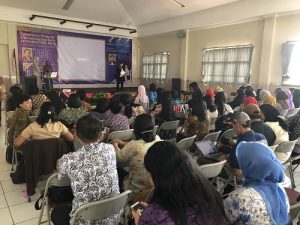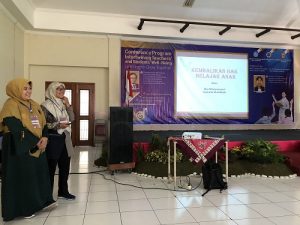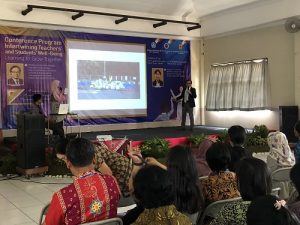On October 20, 2018, the Tokkatsu-relevant seminar was held at Santo Yusuf Elementary School, Bandung, Indonesia organized by the Indonesia University of Education and Salib Suci Foundation. The seminar was titled “Intertwining Teachers’ and Students’ Wellbeing: Learning to Grow Together”. The purpose of the seminar was for teachers to be familiar with the holistic model of education, Tokkatsu, and to think of ways to incorporate elements of Tokkatsu into their daily classroom teaching. Professor Ryoko Tsuneyoshi from the University of Tokyo and Professor Kazuhiko Nambu from Bunkyo Gakuin University were invited to give lectures on holistic approaches to education. Professor Tsuneyoshi provided an overview why there is an increasing interest for non-cognitive aspects of learning internationally, and how Tokkatsu activities build foundations for students to learn not only social skills but those skills needed for subject learning. Professor Nambu explained different activities under the Tokkatsu scheme and how building relationships with and among students are key in making learning experience useful. The seminar was attended by 150 participants who were mainly local elementary school teachers.The seminar was partly funded by the Grants-in-Aid for Scientific Research (KAKENHI), Kiban A, No.15H01987, “A Cross-National Research of Japanese Educational Efforts to Meet the Needs of the 21st Century and the Construction of International Models: Exploring Pluralistic Models.” (Head: Ryoko Tsuneyoshi).
In the seminar, two teachers from East Java presented their engagement to Tokkatsu-like activities such as building relationships with students and incorporating collaborative activities within their classrooms. Lesson study has been a popular approach for the professional development of teachers in Indonesia. However, since the didactic style of teaching is common, both students and teachers were not familiar with the collaborative approach to learning. Thus, these teachers used the Tokkatsu classroom activities as a way for students to experience collaborative learning. In the afternoon, teachers were divided into different groups and discussed how to ensure the rights of students to learn and what teachers can do to support the individual learning of students. The seminar participants deepened their understanding to a holistic approach to education and some of them said they were planning to use the approach in their daily classroom activities.





